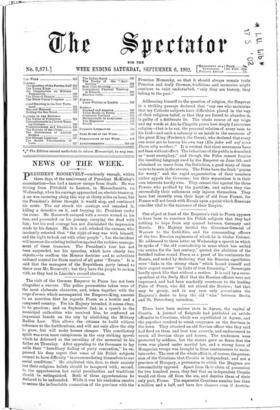Addressing himself to the question of religion, the Emperor in
a striking passage declared that " any one who maintains that my Catholic subjects have difficulties placed in the way of their religious belief, or that they are forced to abandon it, is guilty of a deliberate lie. The whole course of my reign and my words at Aix-la-Chapelle prove how deeply I reverence religion—that is to say, the personal relation of every man to his God—and such a calumny is an insult to the successor of the great King (Frederick the Great), who declared that every one must get to heaven his own way (Ein jeder soil auf seine Fa; on selig werden)." It is evident that these assurances have not been without effect. The behaviour of the public is described as "most exemplary," and though the Poles cannot forgive the insulting language used by the Emperor on June 5th, and abstained en masse from the festivities, a good many of them were to be seen in the streets. The Poles have the Irish "genius for worry," and the rapid augmentation of their numbers rather appals the Germans; but their separatism is in their own interests hardly wise. They cannot rise against the three Powers who profited by the partitian, and unless they rise successfully their sullenness only injures themselves. They have lost recently even their hope of aid from France, for France will not break with Russia upon a point which Russians consider vital to the existence of their Empire.






































